♀️ The Trailblazing Women of Wall Street
Women have long shaped Wall Street—even when history tried to write them out.


Quietly, without much fanfare yet, the Schooner Apollonia has arrived to the shores of Manhattan – one of the first ships to bring freight goods by sail to New York City in about a century. The reconstitution of the Apollonia has been a multi-year passion project by a small team up in Hudson, New York to re-outfit the ship, built for ocean crossings in 1946, to carry cargo from the Hudson Valley down to New York and back. The Untapped New York team first met the folks behind the Apollonia in 2017 on a boat cruise up the Hudson River boat attended by stakeholders supporting the S.S. Columbia, another historic ship bound for the Hudson River soon. It is with great excitement we share with you the Apollonia’s inaugural voyage down to New York City.
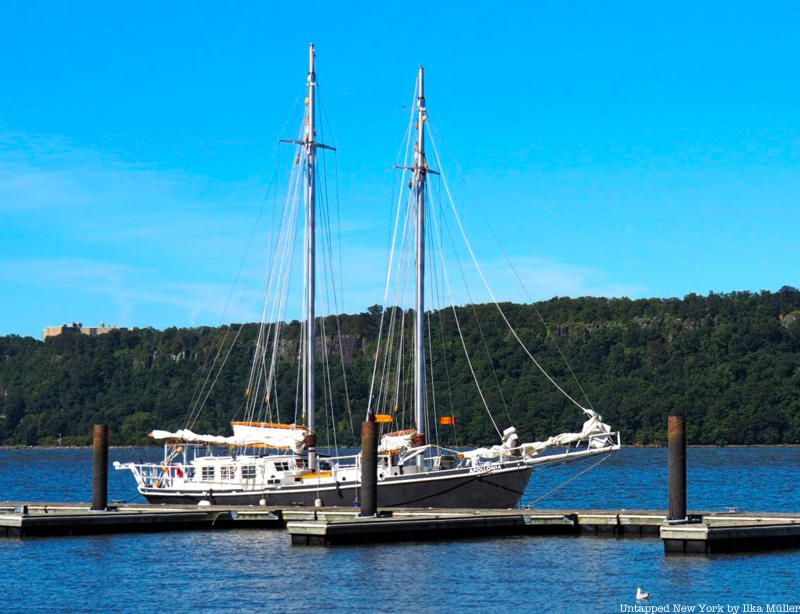
Photo by Ilka Müller.
On board the Apollonia are brewer’s malt, corn, and grain bound for Van Brunt Stillhouse in Red Hook and Strong Rope Brewery on Gowanus, along with petroleum- and plastic-free pillows from Likeminded Objects in Hudson, CBD oil from an organic hemp farm, kombucha, yarn, handmade wooden barrels from Cooper, and more. Speaking this morning to us at the Dyckman Marina in Inwood, where the Apollonia moored overnight, Sam Merrett, the captain, mechanic, and one of the founding members behind the boat’s resurrection says, “We are a cargo and freight vessel, so our purpose is to move stuff. And of course, our way of doing that is with the wind. It’s carbon neutral, it doesn’t require fossil fuels, it doesn’t require trucks, cars, highways, any of that stuff. But what’s so exciting for us is that beyond just moving stuff, we can connect people. The Hudson River was the original superhighway of the region…New York was built to be entered from the water and the same is true of all the towns upstate.”
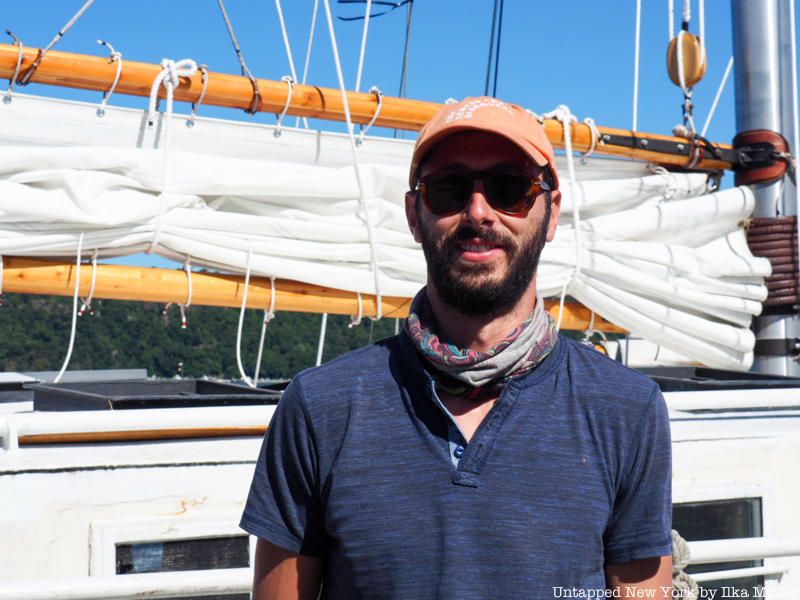
Captain Sam Merrett in front of The Apollonia this morning
The Apollonia is is owered by wind and uses vegetable oil, making it Hudson Valley’s largest carbon-neutral merchant vessel. The Apollonia is being run as a for-profit business with a mission that has “a transparent and reproducible business model — to provide carbon-neutral transportation for shelf-stable local foods and products. Connecting the traditions of slow food, fair trade, and carbon neutrality, we will inspire and train a new generation of Hudson River stewards and create green living-wage jobs in the growing river-based economy,” the organization attests. As Brad Vogel, Captain of the Gowanus Dredgers Canoe Club and a veritable New York City waterfront history maven tells us, “It’s been rewarding for me to help the team as a ‘sail freight agent’ of sorts on the side, generating potential cargo leads here in the city.”
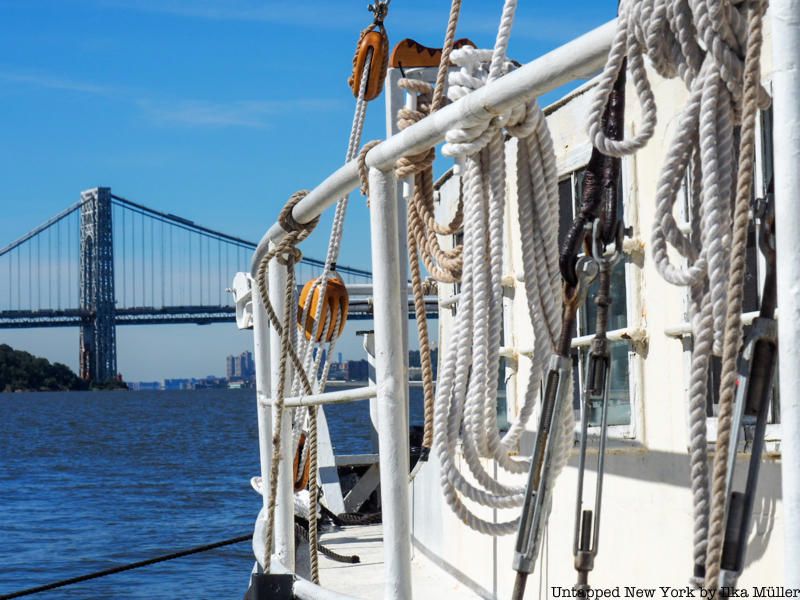
With the challenging environment brought forth by the coronavirus pandemic, The Apollonia decided to partner with the Hudson River Maritime Museum in Kingston, a not-for-profit organization dedicated to the preservation and interpretation of the maritime history of the Hudson River, its tributaries, and related industries. The inaugural journey by the Apollonia is thus not only a business endeavor, but also an educational one. The Museum is sailing its own ship, the Solaris, the only US Coast Guard-approved 100% solar powered passenger vessel in the United States, to accompany the Apollonia. This trip, dubbed Riverwise, is being filming for a potential documentary, and the Hudson River Maritime Museum is currently seeking donations to support the effort. “We’re just going to meet people and learn their stories and share that as much as possible” Merrett said to us, while an interview was taking place with Vienna Carroll, a local Black historian and musician (who has a talent in sea shanties and taught a few to the crew this morning!).
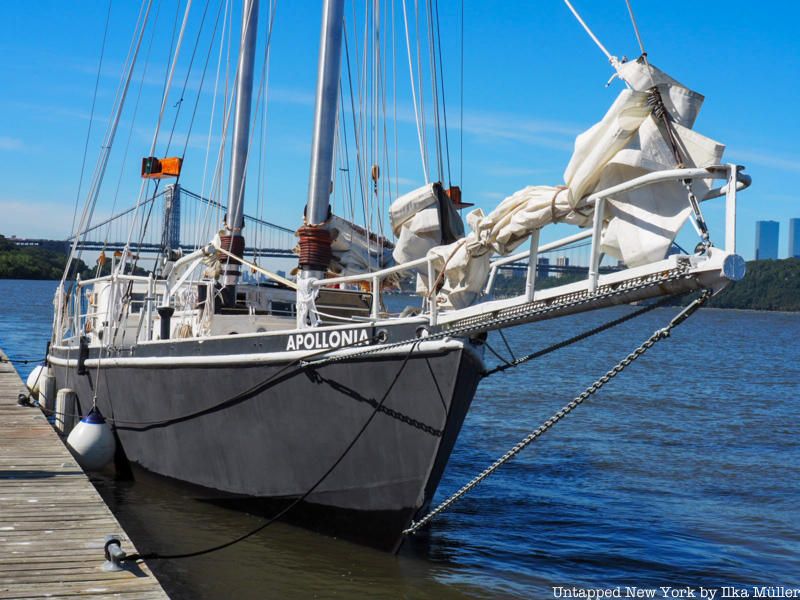
As Davis Janowski wrote while covering the Apollonia in 2018 for The New York Times, boats like the Apollonia plied the Hudson River from the early 1700s to the early 1900s: “While steamboats took over the more lucrative passenger trade, schooners and sloops delivered the bulk of nonperishable foodstuffs and other commodities that were used in everyday life. It was more economical and generally slower — unless you caught favorable winds. But slow is actually part of the equation for those working to bring back sail freight.”
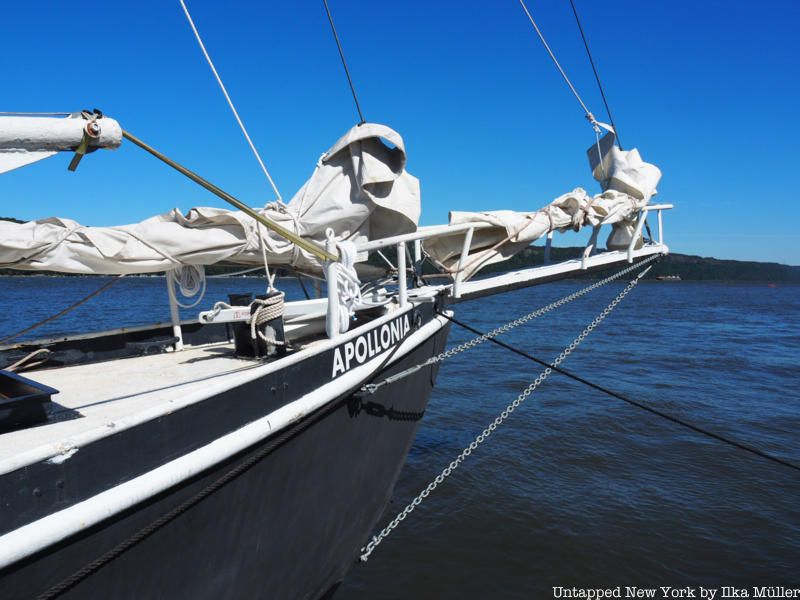
“This is the furthest out we’ve come, ” says Sam, “This is really just the start of us…establishing trade routes and building shipping partnerships.” Apollonia and Solaris have been making its way down the Hudson River from Kingston since last Thursday, and spent overnight last night in Inwood. The crew is usually a team of three, but the boat has been sleeping six, including the videographer, for this voyage.
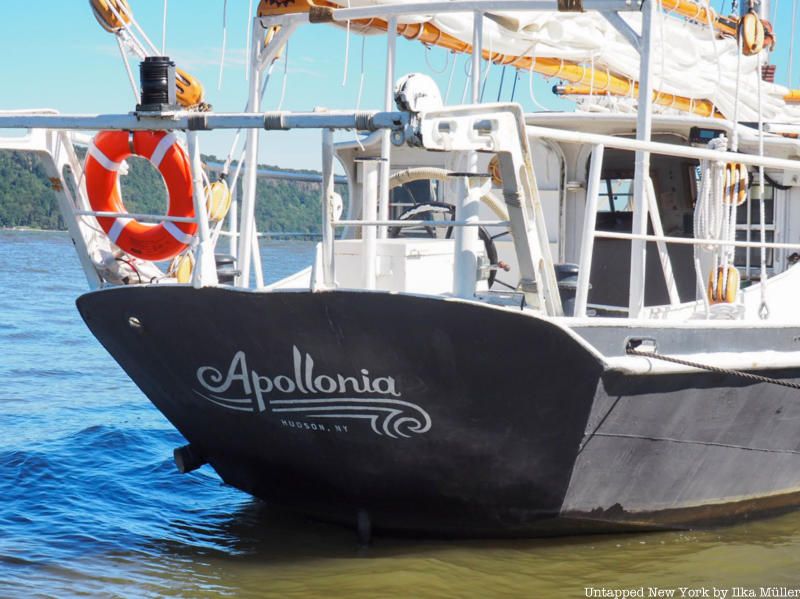
Later today, the boats will make their way to lower Manhattan, where they will join a fleet of Classic Harbor Line boats for a sail to the Statue of Liberty and Battery Park. Merrett excitedly shares that they will go past Robbins Reef Lighthouse, off Staten Island, one of our favorite gems in the harbor. The boats will dock overnight at OneMarina in Brooklyn Bridge Park, and will stop tomorrow at Governors Island to meet with the Billion Oyster Project and the Harbor School, and then the Apollonia will unload its cargo in Red Hook in the afternoon. The boat departs New York City on Saturday for its return to the Hudson River Maritime Museum in Kingston. The organizations encourage visitors to view the boats from the shore over the next two days.
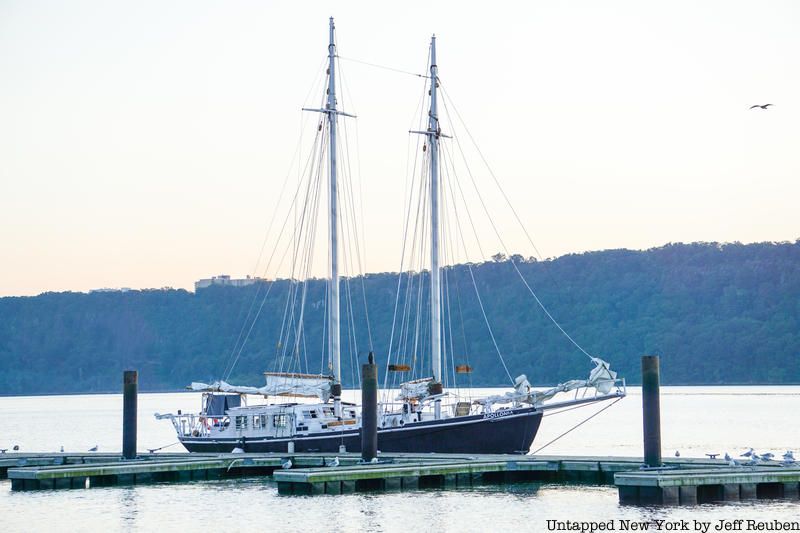
Learn more about The Apollonia and the Hudson River Maritime Museum, and support the Riverwise project here. Photography and interview for this article by Ilka Müller.
Subscribe to our newsletter